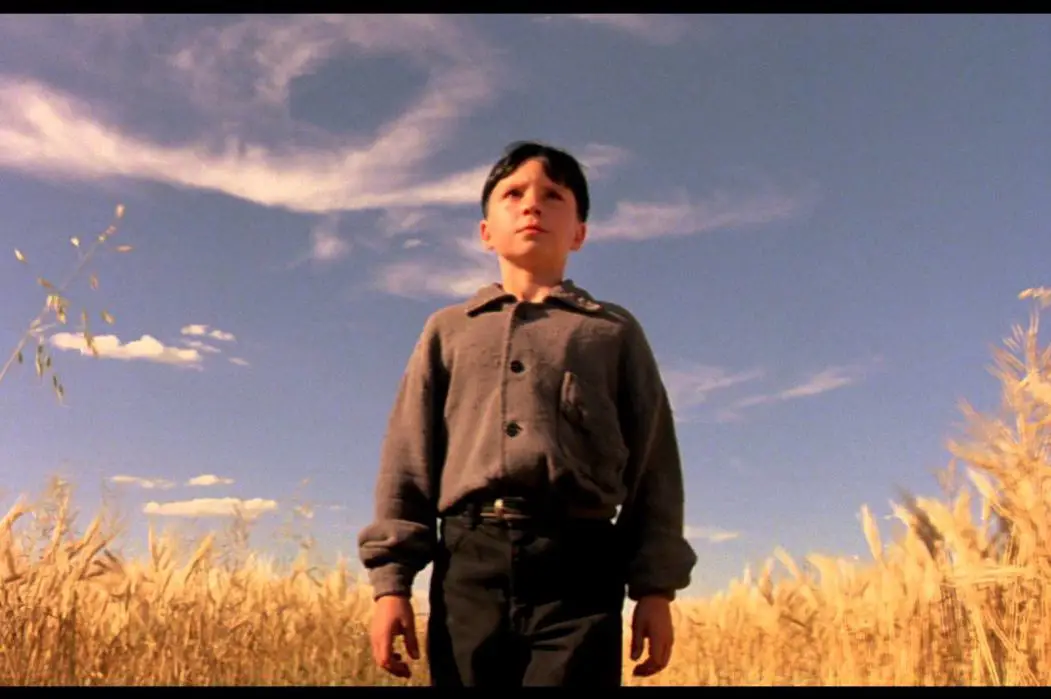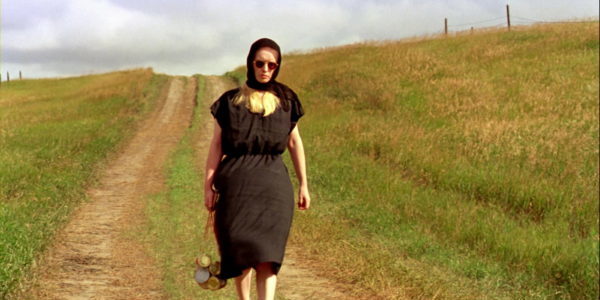Video Dispatches: WAGON MASTER, MA & THE REFLECTING SKIN

Midwesterner, movie lover, cinnamon enthusiast.
Video Dispatches is a regular column covering recent home video releases.
Wagon Master (1950) – Warner Archive

Warner Archive’s Wagon Master marks the second significant Blu-ray release of John Ford’s films in 2019, following Twilight Time’s March release of The Whole Town’s Talking. This film is 15 years later, more archetypal of his filmography and, frankly, much better — not to deride the earlier film much, because it is a strong entry of its own, but Wagon Master is simply a delightful and incredibly composed picture, and apparently one of the filmmaker’s favorites of his own oeuvre.
Wagon Master follows a couple of horse traders familiar with the land as they’re commissioned by a caravan of Mormons to get them to the San Juan Valley. As even Ford novices might guess, the film quickly develops into a text about the strength of family — traditional or otherwise — and surveys its landscape with an absolutely dreamy eye. “Seldom has the western landscape seemed such a tangible emblem of hope and freedom,” wrote Dave Kehr in Chicago Reader. “A masterpiece beyond question — but a masterpiece that never degenerates into pomposity or self-consciousness. It’s American filmmaking at its finest and most eloquent.”
Unlike the aforementioned Twilight Time release, which was frustratingly bare bones — something Warner Archive are often guilty of — this disc has a commentary, which was also available on the previous DVD release, with the film’s star Harry Carey Jr. and Peter Bogdanovich, and even includes a bit of Ford’s own thoughts culled from a previous source with Bogdanovich.
Get Wagon Master on Blu-Ray here
Ma (2019) – Universal Pictures

Blumhouse Productions butter their bread with high-concept, low-budget horror like Happy Death Day, Unfriended and The Purge, but the best theatrical film they’ve put out in 2019 is about as low-concept as they come: high school kids in need of both booze and a new place to party find Sue Ann, a local middle-aged woman who, despite being a bit odd, is happy to provide both.
Octavia Spencer provides the predatory Sue Ann, and it’s without a doubt one of the finest performances of the year that I’ve come across. It won’t be taken seriously, of course, but Spencer is doing good work, and director Tate Taylor is wise to give her so many closeups where she can do some nuanced facial work. Spencer has racked up quite the mind-numbing catalog this decade, but Ma shows us just how talented she is, and how willing she is to make some risky choices. In a year where both Spencer and Isabelle Huppert play women preying on attractive young folk, and Huppert teamed up with Neil Jordan while Spencer went with the director of The Help, I’m as surprised as anyone that Spencer came out with the better film.
Though Universal’s Blu-ray boasts a handful of features, including an alternate ending, one specifically about Sue Ann’s character and another about the basement parties, they’re all unfortunately throwaway bits. The latter two aren’t surprising, but I was hoping he alternate ending might have gone some way to fixing the ill-advised racial turn in the film’s third act. Instead, we get a two-minute ending that feels attached for the sake of having another bonus supplement.
The Reflecting Skin (1990) – Film Movement

FIlm Movement’s recent release of a 1990 curio, Philip Ridley’s The Reflecting Skin, is understandably quite a blessing for the director, who says in the included booklet that he hasn’t been able to experience it properly in two decades. Following butchered treatment on home video and poor quality clips popping up on YouTube, this 2K scan must be a dream come true. As Ridley mentions, it’s a film “about images and visual ravishment,” and ravished viewers will be by the work of Dick Pope — a cinematographer best known for his long-standing collaboration with Mike Leigh — who shoots the everloving shit out of this film and its cornfield location.
A film about a young boy (Jeremy Cooper) in 1950s rural America (shot in Alberta, Canada), who suddenly loses his father, is convinced the mysterious young widow (Lindsay Duncan) next door is a vampire seducing his other brother (Viggo Mortensen). In weaving this fairly simple story, Ridley puts a lot on the table: pedophilia, loss of innocence, death, trauma, fantasy, national identity and another element best left to the discoverer. Suffice to say, not all of this lands, or meshes well together. In fact, much of the film can feel at odds with itself because of how much Ridley is playing with. It’s a risky film, and while I can’t in good faith call it a successful one, more importantly The Reflecting Skin is a bizarre film.
In their nice booklet essay, Travis Crawford and Heather Hyche call the film a semi-horror film and tackle the oft-made comparisons to David Lynch’s Blue Velvet, which they attribute to starting with Ridley himself. I suppose I get the parallels, although tenuous, and they do well to parse how The Reflecting Skin deviates, but the mere mention of Lynch’s masterpiece doesn’t do Ridley any favors. Although of varying sizes, apparently both films have garnered cult followings. That’s understandable, especially, as Crawford and Hyche note, given its lengthy period relegated to shitty VHS transfers. Though I have serious misgivings about the film, I’m sincerely happy its fans now have a loving package and gorgeous HD transfer to dive into.
Get The Reflecting Skin on Blu-Ray here
Does content like this matter to you?
Become a Member and support film journalism. Unlock access to all of Film Inquiry`s great articles. Join a community of like-minded readers who are passionate about cinema - get access to our private members Network, give back to independent filmmakers, and more.













